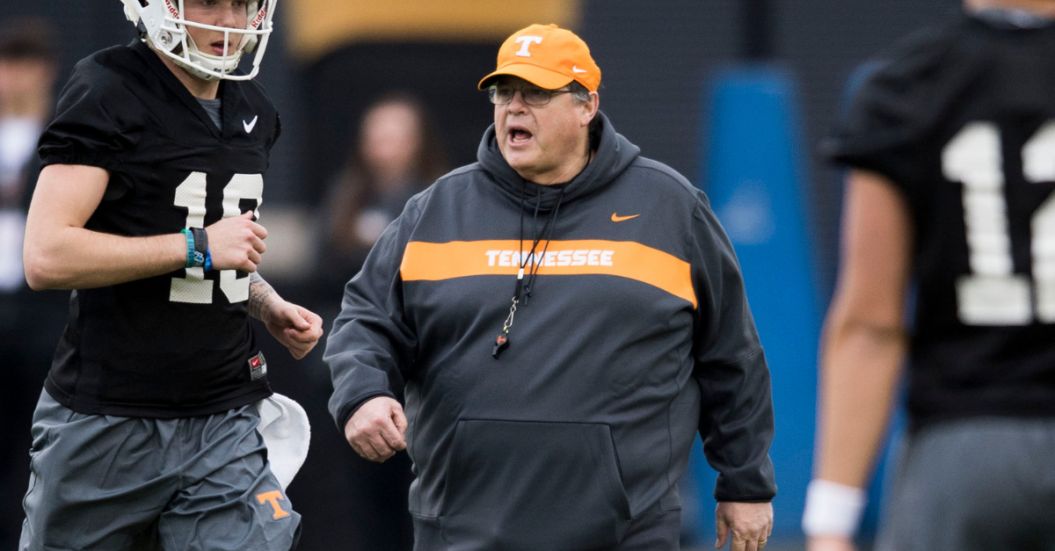KNOXVILLE, Tenn. (AP) — There has been plenty of coaching turnover in the Southeastern Conference this offseason, just not involving any head coaches.
Videos by FanBuzz
This will be the first year since 2006 that the SEC begins a season with no new head coaches. But despite the continuity at the top, there has been nearly a 40 percent turnover in offensive and defensive coordinators.
The reasons vary. Some SEC coordinators became head coaches, a couple moved on to the NFL and some left for coordinator jobs at other schools. But all that shuffling is business as usual in the SEC, where no coordinator has spent more than three full seasons at his current position.
"All you need to do is make it your best day. Keep getting better every day."
🎙 [ Jim Chaney Mic'd Up ] 🎙#PoweredByTheT pic.twitter.com/nR6CAUY7XB
— Tennessee Football (@Vol_Football) April 5, 2019
RELATED: Talladega is So Massive, You Can Fit All 14 SEC Football Stadiums Inside It
"I think so many people look at football as so much different than their own particular jobs, and I never quite see it that way," Tennessee offensive coordinator Jim Chaney said. "Don't people in you all's position move and do different things? We do too."
While the Big 12 and Atlantic Coast Conference had a similar amount of coordinator turnover, those conferences have a combined seven new head coaches who initiated staff overhauls.
The movement in the SEC last year was a result of coordinators getting opportunities elsewhere.
And that's not new.
The longest-tenured SEC coordinators are LSU defensive coordinator Dave Aranda, Kentucky offensive coordinator Eddie Gran and Auburn defensive coordinator Kevin Steele. They're all entering their fourth seasons. Missouri's Ryan Walters was co-defensive coordinator from 2016-17 before getting promoted to sole coordinator in December 2017.
The Vols' Chaney exemplifies the nomadic nature of an SEC coordinator. He's back for his second stint as Tennessee's offensive coordinator after holding the same title at Arkansas, Pittsburgh and Georgia since his last stay in Knoxville.
In all, the SEC has new faces at 11 of the 28 conference's coordinator positions when counting Mississippi State head coach Joe Moorhead and Auburn offensive coordinator Kenny Dillingham. Moorhead will serve as his own offensive coordinator and Dillingham began his new job at last year's Music City Bowl .
The only 2018 SEC coordinator who got fired was Mississippi defensive coordinator Wesley McGriff.
Four of the SEC's coordinators from 2018 are now head coaches: Western Kentucky's Tyson Helton (former Tennessee offensive coordinator), Troy's Chip Lindsey (Auburn offensive coordinator), Maryland's Mike Locksley (Alabama defensive coordinator) and Colorado's Mel Tucker (Georgia defensive coordinator). Helton and Lindsey got head coaching jobs even though Tennessee finished last and Auburn ranked 11th out of 14 SEC teams in yards per game last season.
Two other SEC coordinators from last season became NFL assistants. Three are now coordinators at other Power Five programs. Kevin Sherrer, Tennessee's defensive coordinator last year, became the Volunteers' special teams coordinator.
"You're always prepared as a coach," said Georgia coach Kirby Smart, who got his job after an eight-year stint as Alabama's defensive coordinator. "You know guys get opportunities."
Even when they're well paid. A seven-figure salary for an SEC coordinator isn't unusual anymore.
Aranda made $2.5 million last year, the most of any coordinator in college football. Steele is making $1.9 million this year Tennessee is paying its new coordinators a combined $2.5 million this year. Chaney is getting $1.5 million while new defensive coordinator Derrick Ansley is earning $1 million.
"We're committed to having the best staff we can possibly have to help get us where we want to be," Tennessee coach Jeremy Pruitt said.
Eight college football coordinators — including four in the SEC — earned at least $1.5 million last year, according to the USA Today assistant coach salary database. This year, the SEC alone will have at least eight coordinators making at least $1.5 million.
Joining Aranda and Steele in the $1.5 million club are Texas A&M defensive coordinator Mike Elko ($2.1 million), Florida defensive coordinator Todd Grantham ($1.79 million), new Alabama offensive coordinator Steve Sarkisian ($1.55 million), Chaney ($1.5 million), Arkansas defensive coordinator John Chavis ($1.5 million) and new Ole Miss defensive coordinator Mike MacIntyre ($1.5 million).
Meet the new coaches! ⤵️
🔗 https://t.co/Hq1h2NsTRG#OutworkYesterday | #RollTide pic.twitter.com/9O8q1yPP5B
— Alabama Football (@AlabamaFTBL) February 15, 2019
Sarkisian and Chaney landed in rarified air; last season no college football offensive coordinators made as much as $1.5 million.
While the short tenures for most SEC coordinators might make this seem like a job for a young up-and-comer, the typical coordinator actually arrives with plenty of experience.
The list of new SEC coordinators this year includes three former Power Five head coaches: MacIntyre (California), Sarkisian (Washington and Southern California) and Ole Miss offensive coordinator Rich Rodriguez (West Virginia, Michigan and Arizona).
Conventional wisdom suggests frequent turnover at the coordinator level causes instability. Defending national champion Clemson has Brent Venables entering his eighth year as defensive coordinator with Tony Elliott and Jeff Scott beginning their fifth seasons as co-offensive coordinators.
But Alabama's status as a consistent title contender shows coordinator changes don't have to be a hindrance. Sarkisian is Alabama's fourth offensive coordinator in as many seasons.
Crimson Tide coach Nick Saban notes that bringing in a new coordinator doesn't necessarily mean introducing an entirely new scheme.
"We're going to run our offense," Saban said, "and we're going to do the things that we do."
